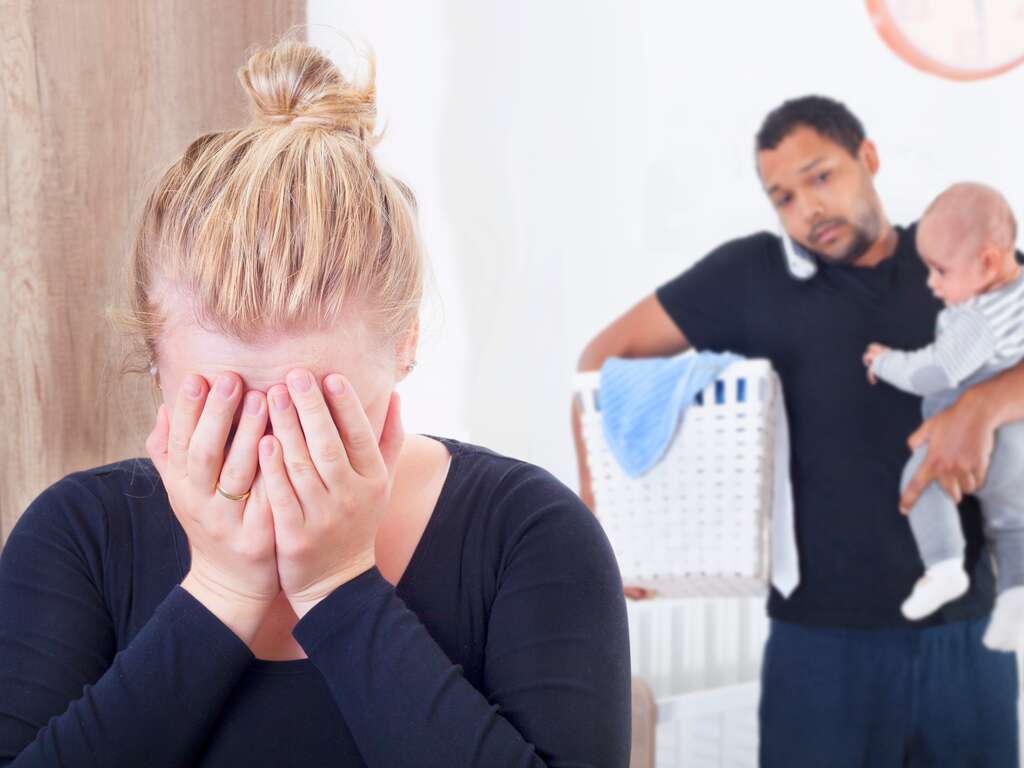Pregnancy is a beautiful thing, and many women look forward to becoming mothers. Raising a child is a major milestone, after all. However, it’s not all baby showers and gender reveals. There are certain difficulties that you must face during and after pregnancy. The latter is called postpartum complications, and encountering them is something that most women will experience.
Don’t get us wrong — motherhood is still a rewarding part of your life. But contrary to popular belief, it usually doesn’t come naturally to most mothers. More often than not, the baby’s health is prioritized over theirs. But mothers need support, too, especially as they navigate this new journey.
The Maternal & Family Center at CarePlus New Jersey, has shared a comprehensive guide to help expecting or new mothers and their loved ones. This can be used as a guide for the postpartum period and all the good and bad things associated with it. In addition, we’ve included pointers for a comprehensive postpartum visit at our center. Here’s all you need to know about postpartum health.
What Is the Postpartum Stage?

The postpartum stage, also called the fourth trimester or postpartum period, starts right after a woman gives birth. It ends when their body returns to a pre-pregnancy state, and it typically happens in a span of six to eight weeks. During this critical transition period, you will also experience drastic changes in your body while recovering from childbirth. Because of these bodily adjustments, you are vulnerable to postpartum complications.
In fact, most pregnancy-related deaths happen during the postpartum period. Injury from birth, fluctuating hormone levels, and other factors are to blame. According to the World Health Organization, maternal mortality occurs mainly because of health complications after birth. Up to 75% of all maternal deaths are caused by excessive bleeding, infections, and high blood pressure during pregnancy.
To ensure that you experience a normal and safe postpartum period, you must be prepared for what is going to happen. You should understand ways for optimizing postpartum care, how to avoid risk factors, and how to access healthcare providers that can help with any issues.
What Postpartum Complications Should Women Expect?

There’s still a larger percentage of women who don’t experience life-threatening postpartum complications. Still, you might be worried about certain things that might seem dangerous, like pain in the breast or blood sugar swings. These are all perfectly normal and should be expected.
Typical Issues You’ll Encounter
- Vaginal Discharge: Lochia or postpartum blood happens for up to six weeks after giving birth. The discharge is usually composed of blood, uterine tissue, and mucus. If you’re discharging more than 1000 mL of blood, then it could be a sign of a hemorrhage — a major concern.
- Breast Pain: Breastmilk will build up in your breasts, making them feel engorged, hard, and painful. This is normal. Just let your little one feed and the issue will hopefully subside.
- Fluctuating Hormone Levels: Certain hormones drop dramatically during the postpartum period. You’ll need a few days or weeks to bring them back to regular concentrations. Until then, you might feel mood swings, anxiety, and irritability. This is called baby blues, and they last only a few weeks postpartum. If these symptoms remain and become an impediment to your daily life, then that might be a sign of postpartum depression.
- Contractions: As your uterus returns to its original size, it will also contract to stop bleeding. So don’t be surprised if you start feeling as though you’re giving birth to a new baby. It’s a normal occurrence that lasts two to three days postpartum.
When to Rest and What Activities to Try
After you give birth, you’ll feel tired. With all the pushing and exertion, your energy levels will be drained. However, the baby will be your priority over sleep, and most women follow their child’s sleeping schedule during the early postpartum period. Still, you have to make sure that you get enough rest to avoid insomnia and other issues.
In terms of other activities, don’t jump immediately into anything strenuous or physically demanding. Keep your actions and movements limited, and don’t try lifting heavy weights or running.
To help your body heal faster, try using ice packs near the incision site or anywhere you have stitches. Sitting in a sitz bath can also accelerate tissue healing and soothe hemorrhoids, which often show up during the postpartum period.
What About Breastfeeding and Breast Care?
As mentioned above, your breasts will start to engorge and feel painful after you give birth. This will happen whether you’re bottle feeding or breastfeeding since your hormones will continue to facilitate the production of milk. Here’s what you can do:
- Wear well-fitting bras that provide optimal support.
- Use a breast pump to release some of the milk.
- Take analgesics or pain relievers to reduce your discomfort. Make sure that you’re taking the appropriate breastfeeding medicine as advised by your healthcare provider.
- Nurse your baby whenever you can to prevent the build-up of breast milk.
There are rare cases when breast milk refuses to come immediately after birth. This can be caused by several factors, like premature delivery or underlying issues, like polycystic ovary syndrome, or PCOS. However, this is not a cause of concern in most cases. Stimulating your breasts with pumps or manually will encourage milk production. Soon enough, your breast milk will flow.
If all else fails, there are always milk banks or baby formula. Our Maternal & Family Center will help you access these needs as part of our postpartum care services.
Birth Control and Reproductive Life Planning
Becoming fertile after giving birth happens closer than you think. You may start ovulating as early as 45 days during the postpartum period. That’s why going back to birth control is a must if you and your partner are going to be sexually active. While there is no set period before women can have sex with their partners, most doctors advise couples to wait for at least four to six weeks postpartum.
This time period coincides with the weeks you normally start ovulating, so you have to pick the appropriate kind of birth control. Birth control pills are not usually the most recommended method since you’ll want your menstrual cycle to return to normal first. So most health care providers suggest condoms, contraceptive patches, and long-acting reversible contraception (LARC) devices.
Whichever method you choose, it should be part of your future pregnancy planning. Spacing out pregnancies (if you plan to have more children) will help reduce risk factors and lead to healthier deliveries in the future.
Diet and Exercise
Weight gain during pregnancy is perfectly normal, and you shouldn’t feel bad for putting on additional pounds. Nor should you feel any pressure trying to get back to a slimmer pre-pregnancy body. Your maternal health care provider will instead recommend that you focus on keeping yourself healthy for you and your baby. This means healthy eating and moderate exercise.
Make sure you eat enough nutritious meals that have components from the basic food groups. You should also drink fluids to replenish the ones you lost while breastfeeding. Finally, add high-fiber fruits to your diet to ensure regular bowel movements. Don’t forget to take the vitamins and iron pills prescribed by your healthcare provider.
As for exercise, always consult your doctor before starting a formal fitness program and similar activities. However, we do recommend that you try Kegel exercises. These will help strengthen the pelvic floor muscles without being too strenuous to the body.
What Happens Women During the Postpartum Period?

Pregnancy and giving birth change the body drastically. Your hormone levels go haywire, your belly expands, and your brain rewires itself. Along with these changes are some issues that can manifest even during the early stages of pregnancy. However, the most dangerous risks women face happen after delivery. Here are just some of the postpartum complications you may experience:
Physical Problems
The first category is physical issues. These are the more obvious physiological changes that the body undergoes after delivery.
Hemorrhage
Postpartum hemorrhage (PPH) is a rare but serious condition that could result in maternal mortality. When a woman is about to give birth, her uterine muscles contract. This puts pressure on bleeding vessels to prevent blood loss. However, there are times when contractions aren’t enough, which results in heavy bleeding. Rarer still, the uterus can rupture because of trauma or previous surgeries.
PPH is dangerous because it leads to blood loss and a severe drop in blood pressure. If a woman loses more than 1000 mL of blood days or weeks after birth, that’s considered a PPH case. In addition, losing up to 500 mL of blood within the first 24 hours of birth is also classified as PPH. The severity of this blood loss is often the reason for many pregnancy-related deaths.
To address this issue, a blood transfusion may be necessary. You’ll also need to take medication that stimulates contractions and helps stop bleeding.
Gestational Diabetes Mellitus
Developing diabetes during pregnancy is one of the more common complications faced by soon-to-be mothers. In normal situations, the pancreas is able to produce the needed amount of insulin to regulate your blood sugar levels. During pregnancy, you may start gaining weight. This causes the pancreas to work harder and may even cause cells to use insulin inefficiently, which is called insulin resistance. When the pancreas can longer provide enough insulin to regular blood sugar levels, you have diabetes.
The good thing is that gestational diabetes usually ends after you give birth. In addition, it rarely manifests into any physical symptoms that other people experience. There is, however, a greater chance of you developing diabetes later in life after pregnancy. The baby may also be affected. They might be born before term, have low blood sugar levels, and have a higher chance of developing diabetes during their lifetimes.
Urinary Incontinence
Urinary incontinence is a term used to describe involuntary peeing after pregnancy. Women usually have weakened bladder muscles, which can result in something as mild as leaking a few drops of urine to complete loss of bladder control. This happens because muscles on the pelvic floor are stretched, and they need time to return to their previous strength levels. Until then, you will experience occasional leaking whenever you laugh, sneeze, or exert yourself.
One in three women experiences urinary incontinence after giving birth. Thankfully, the issue goes away after a few weeks postpartum. If it doesn’t go away after a few months, then you might need to see your primary care provider for advice. They may refer you to a physical therapist or continence nurse that can help you address the issue. Addressed early on, postpartum urinary incontinence won’t become a life-long issue.
Cardiovascular Diseases
The profound changes women’s bodies undergo during pregnancy pose an adverse effect on their cardiovascular health. These put stress on the heart and the rest of the circulatory system since you’re also supplying oxygen and nutrients to another human being inside you. During delivery, your heart puts in more effort, especially when you push. There is also fluctuating blood pressure, straining the heart even further.
Because of all these, you may start experiencing cardiovascular issues after you give birth. That includes high blood pressure or postpartum hypertension, heart rhythm issues, and rapid heartbeat or tachycardia. If you already have some mild heart issues before pregnancy, then these might worsen during late pregnancy up to weeks postpartum. Some will resolve eventually, but others will become chronic medical conditions and affect you for the rest of your life.
It’s best to work with a health care provider to address these issues before they become bigger problems. They may suggest medications or treatments that help reduce cardiovascular problems.
Hemorrhoids
Postpartum hemorrhoids are another unfortunate side effect of natural births. It’s not the vagina that will hurt the most in some cases. It’s going to be the perineum, the short strip of skin connecting the anus and the vagina. In 9 out of 10 cases, this area will tear because of the stretching and pushing you’ll need to do to get the baby out. Not only is this painful, but the pressure can result in hemorrhoids or swollen veins in the anus.
Hemorrhoids can feel painful and result in rectal itching. In addition, you may experience bleeding after pooping. They usually go away a few weeks postpartum, but they may return during subsequent pregnancies. To help ease the symptoms, you may try sitz baths, use ice packs during postpartum care, or take anti-inflammatory and analgesic medications. For the latter, make sure to consult your health care provider to ensure that your medicines are appropriate for postpartum health.
Surgery Pain and Inflammation
After a Cesarean, or C-section, women will feel pain and inflammation in the incision site and nearby areas. This might be heightened by contractions that are akin to menstrual cramps. This happens because the uterus is trying to reduce the bleeding, much like it would in a natural birth. Of course, the contractions will only aggravate the tender site and cause pain.
To reduce swelling and discomfort, health care providers usually prescribe over-the-counter analgesics. Just make sure to follow them to avoid further postpartum complications.
Infections
Another common cause of pregnancy related deaths is infections. Pregnant women are more vulnerable to bacteria and viruses because of physiological factors and iatrogenic trauma. The latter refers to wounds and bruises caused by medical examinations and surgery. When microorganisms enter the uterine wall or genital tracts, they can cause an infection and trigger an immune response.
Left unchecked, an infection can escalate into sepsis. This refers to the overwhelming response of the immune system against bacteria or viruses, which also results in cell death. To avoid these scenarios, postpartum women can take most types of antibiotics.
Mental Health Problems
One in five women develops some form of mental and emotional health issue at any time during their pregnancy. However, most of them start showing signs after the first few weeks of delivery or during the early postpartum period. Here are the most common pregnancy-related complications that affect your mental and emotional state:
Postpartum Depression
One of the most common postpartum period issues women encounter is depression. This is sometimes called baby blues, but postpartum depression is much more severe and lasts a longer time. The more accurate alternative term is postnatal depression, or PND. Unlike baby blues that last for up to two weeks, this issue can last for months to years after the postpartum period. It is considered one of the mood disorders, which include bipolar disorder and dysthymia.
Like major depression, this PND has symptoms like:
- Depressed mood
- Severe mood swings
- Crying too much or showing no emotions at all
- Failing to form bonds with your baby
- Hopelessness and restlessness
- Insomnia or lack of sleep
- Withdrawal from social relationships
- Loss of interest in hobbies, work, and even your partner
- Thoughts of self-harm and suicide
The most common cause of PND is hormonal fluctuations. After you give birth, your estrogen and progesterone levels drop dramatically, causing a chemical imbalance in the brain. However, it’s not as simple as that. Other factors will also affect your behavioral and emotional well-being.
Women who’ve been previously diagnosed with depression are more likely to get it again after pregnancy. In addition, those who have suffered abuse and trauma in the past are also more vulnerable to getting PND. The environment you’re in during your postpartum period will also have an effect.
If your blues are lasting longer than usual, and you experience the other symptoms mentioned above, then you’ll want to consult a medical professional or mental health care provider to see if you’re suffering from PND. Don’t leave it unchecked as this could lead to even more severe issues, like postpartum psychosis.
Postpartum Psychosis
Postpartum psychotic disorders happen when someone detaches from reality and starts experiencing hallucinations, delusions, and catatonia. It’s one of the most serious mental health issues out there, and it can be a symptom of other issues, like bipolar disorder or depression.
When someone experiences psychosis, they start getting unusual ideas about themselves and their babies. They also have difficulty distinguishing what is real and what isn’t, and they might have an unshakeable belief about something absurd or impossible without evidence. Sometimes, psychosis can lead to negative symptoms. These include withdrawal from friends or family, lack of emotion, and inactivity.
While most psychotic episodes won’t cause immediate harm to the person or their child, it is still best to seek immediate professional help to ensure that no one gets hurt. There are some scenarios when women with psychosis experience catatonia. When they don’t respond to stimuli or fail to move at all, someone else should take over the care of the baby to ensure that their basic needs are met.
Post-Traumatic Stress Disorder (PTSD)
PTSD is unfortunately not something that only military veterans and abuse survivors experience. Even something as natural as childbirth can cause a woman to develop this type of anxiety disorder. The more accurate term for this is postnatal PTSD, and it may occur when delivery is particularly traumatic.
There are many reasons why childbirth may be traumatic for some women. The most obvious one would be the immense pain they have to endure, especially during long deliveries. However, they call still develop PTSD because of other factors like:
- Emergency treatments
- Unplanned Cesarean sessions
- Other shocking events like the death of the baby
The warning signs of postnatal PTSD include panic attacks, vivid nightmares, insomnia, and intense distress whenever they see reminders of their ordeal. These can impede your daily life and may even cause other mental disorders. In some cases, severe PTSD can lead to depression and psychosis-like symptoms.
To treat this issue, you’ll have to attend psychotherapy sessions and take medications that supplement therapy. It is difficult to overcome trauma, but with consistency and access to the right treatment, you’ll be able to recover and dedicate your time and attention to your newborn.
Risk Factors for Women
There are a couple of reasons why some individuals have healthy deliveries while others are more prone to postpartum complications. Collectively, these are called risk factors, and they come in various forms. Some affect women even before they become pregnant while others are more likely to make an effect during the postpartum period.
- Pre-Existing Mental Issues: Those who have already been diagnosed with mood and anxiety disorders are more likely to develop postnatal PTSD, depression, and even psychosis. This major change in their lives, combined with traumatic experiences they may experience during delivery, is more likely to trigger these mental illnesses once more.
- Pre-Existing Health Issues: Pre-existing diseases caused by your lifestyle and genetics are also considered risk factors. These include problems like hypertension, PCOS, and autoimmune diseases. When you have them, you’re more likely to experience postpartum complications like infections and preeclampsia.
- Use of Alcohol, Cigarettes, and Other Controlled Substances: Drinking excessive amounts of alcohol, smoking cigarettes, and abusing drugs (legal or otherwise) all have major negative effects on women. Not only can these affect your child’s development, but they will affect your body during delivery and the postpartum period. You have a higher risk of premature or preterm birth, may feel constantly fatigued, and are more likely to develop mood disorders.
- Age: The safest time for women to get pregnant is between their late 20s to early 30s. Those who get pregnant under 20 or above 35 are more likely to face pregnancy issues and postpartum concerns. For younger women, their underdeveloped bodies may not be able to accommodate the demands of a growing child. Those who are older may have underlying conditions that result in difficult deliveries and postpartum periods.
- Weight: Being over and underweight will also put your postpartum health at risk. For those who have a BMI that is above average, you’re more likely to develop gestational diabetes mellitus. High blood pressure is also a big concern. For women below the average BMI, you’re more likely to have a premature birth.
- STIs: Some types of sexually transmitted infections can make you more vulnerable during delivery and the postpartum stage. If you have a pre-existing STI, you’re more likely to experience infections from wounds and incisions. There’s also the danger of passing the STI to your child, particularly the human immunodeficiency virus (HIV). So if you have an existing STI, it’s best to be transparent with your healthcare provider about it. That way, they can take the right approach and ensure that you and your baby are safe.
- Number of Pregnancies: Another risk factor for postpartum issues is previous pregnancies. Those who’ve had five or more past pregnancies are more likely to develop problems like hemorrhage or abnormally quick labor. For those who get pregnant in rapid succession, the risks are much higher. There’s also the matter of multiple pregnancies, such as twins or triplets. Since the uterus can only hold so many at a time, additional fetuses will put a strain on a woman’s body. There’s a higher risk of hypertensive disorders of pregnancy, diabetes, and other life-threatening issues.
Pregnancy Mortality Surveillance System (PMSS)
The CDC has started tracking the deaths of women due to pregnancy related deaths. Disease control and prevention can perhaps save a woman’s life.
CDC conducts national pregnancy-related mortality surveillance to better understand the risk factors for and causes of pregnancy-related deaths in the United States. The Pregnancy Mortality Surveillance System (PMSS) defines a pregnancy-related death as the death of a woman while pregnant or within 1 year of the end of pregnancy from any cause related to or aggravated by the pregnancy.
When to Seek Help
For Physical Issues
It’s much easier to diagnose and treat the physical issues you might encounter during the postpartum transition period. Some of them can even be treated at home with simple remedies and over-the-counter medicines. However, there are a few that will require medical help to avoid pregnancy related deaths.
The first one is infections. While your doctor will probably prescribe antibiotics after delivery, that doesn’t mean that you won’t get an infection. Incision and wound sites are still prone to bacterial invasion, which will result in pain, fever, chills, and other symptoms. Infections should be immediately addressed by your primary care provider to ensure that they won’t escalate into anything life-threatening.
Hemorrhage is also a major concern. Losing blood is dangerous, and you’ll need help getting your blood levels to normal quantities. This must be addressed immediately.
There are other issues like hypertensive disorders and heart conditions, but they’re much harder to detect since the symptoms could be attributed to normal things women experience postpartum. But if you feel problems like chest pain, dizziness, difficulty breathing, or loss of consciousness, then you’ll need immediate medical care.
For Mental and Emotional Issues
Given how mental, emotional, and behavioral health problems are harder to detect and take longer to diagnose, women may experience difficulty getting the help and support they need. But mental issues are as serious as physical ones, so taking care of a person’s mental and emotional well-being is just as important as caring for their bodies.
Mood disorders and anxiety disorders take a lot longer to manifest and become recognizable as legitimate issues. But the universal indication that you should seek postpartum care is when symptoms start getting in the way of your life, especially after weeks or months after your delivery.
For example, feeling sadness or severe mood swings that last for longer than two weeks are no longer just baby blues. The symptoms could be getting worse, making it hard for you to take care of your baby or communicate with your partner. You might also start having intrusive thoughts of harming yourself or your child.
However, we want to impress that you don’t have to wait for the worst-case scenarios before getting help. If you start feeling issues with your mental health, you should try getting postpartum care to get the support and preventative treatments you need. Your obstetrician, primary provider, or maternal nurse will know what to do with your situation.
Turn to CarePlus New Jersey’s Maternal & Family Center
Unmet maternal health needs are an issue all over the US and the world. Because of these, new mothers may feel left out and become more vulnerable to postpartum complications. Thankfully, there are institutions like CarePlus New Jersey and our Maternal & Family Center. We serve as a place where women can access services, especially for their mental health during pregnancy and the postpartum period.
For those in the postpartum recovery or transition stage, we have programs that can help them manage mental illnesses related to traumatic deliveries or the loss of an infant. We have the resources, experts, and capabilities to provide the support that these women badly need. Turn to us whenever you’re dealing with issues like depression, anxiety, psychosis, and PTSD.
Comprehensive Postpartum Visit
We can accommodate postpartum women who need complete health assessments after giving birth. At our center, we can conduct simple evaluations and procedures to check for any issues and refer patients to other health care providers. That way, they can access the right health services they need for whichever type of concern they’re experiencing.
Counseling and Support
You are not alone in your struggle. Millions of women around the world have already faced postpartum issues, and doctors and other healthcare professionals know how to help them. At our Maternal & Family Center, you’ll have access to all these experts, services, and more.
We have licensed counselors and social workers that can offer counseling sessions, helping you process the events of your delivery and the trauma it might have caused. You can also join our support groups composed of women who have been in similar situations. These support groups can happen online or in face-to-face settings.
To help your loved ones understand how to support you, our counseling programs also include education for spouses, dads, and other family members involved in your life.
Care Coordination
We work with your primary care provider, OB/GYN, psychologist, and other medical professionals to coordinate the care you receive. This includes care management and biopsychosocial support. That way, you can get complete postpartum care without redundancies.
Our care coordination program also allows us to work with healthcare providers outside of our network. You won’t need to change doctors with us. We will do the adjustment on our end so you can enjoy more seamless treatment for your concerns.
Medication Management
Counseling and support group programs are usually accompanied by medication to help accelerate your healing. This helps correct hormonal imbalances, reduce symptoms, and even prevent them from returning. At our Maternal & Family Center, we have licensed psychologists and nurse practitioners that have training in medication counseling, evaluation, and management. We’ll ensure that you get the right medication to help with your healing.
Final Thoughts

The postpartum period is a vulnerable time for women, and many might face complications that threaten their health. From physical issues like hypertension and hemorrhage to mental illnesses like postnatal depression and psychosis, many problems can arise that will need medical attention or intervention.
Thankfully, there’s the Maternal & Family Center for women in New Jersey. We accept all women, regardless of their ability to pay or the type of concern they want addressed. For more information, please get in touch with us today!
Sources:
Marchofdimes | Postpartum Hemorrhage
The Bump | Postpartum Hemorrhoids
Mayo Clinic | Postpartum Depression
Healthline | No Breast Milk After Birth? Here’s Why You Shouldn’t Worry
Mind.org.uk | Postnatal depression and perinatal mental health
CDC | Smoking During Pregnancy

CarePlus NJ, INC. is dedicated to excellence in mental healthcare and has a commitment to life-long support needed by individuals and their families to ensure that they achieve their full potential and improve the quality of their lives.

